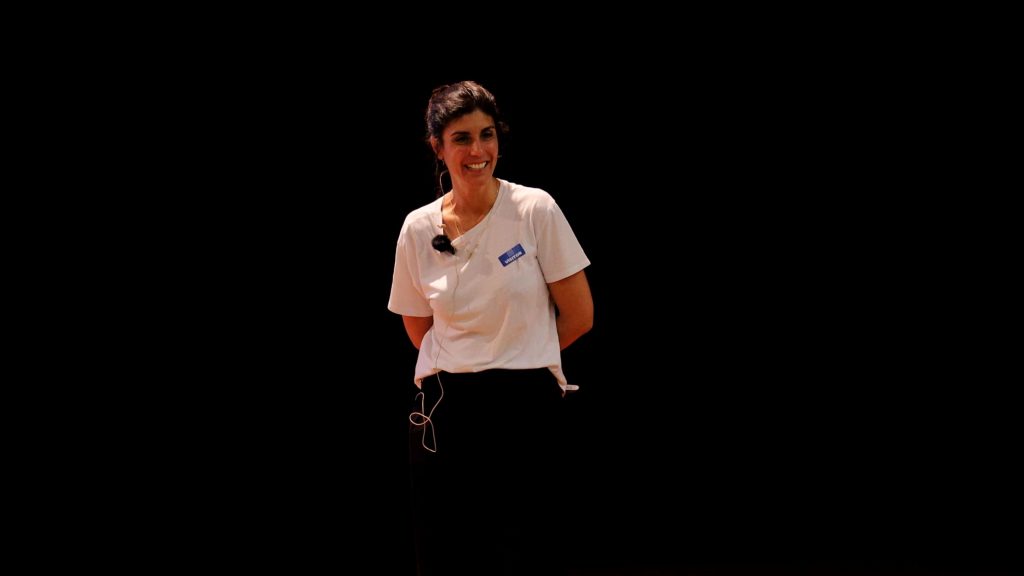
El pasado 2 de mayo, celebramos el Día Mundial de la Libertad de Prensa con una enriquecedora charla para el alumnado de Year 10 a cargo de Raquel Ejerique, directora de informativos de À Punt. Les ha ayudado a profundizar en la relevancia y alcance de este derecho fundamental, explicándoles el estado del periodismo en España en comparación con otros países donde este derecho no está protegido. A continuación exponemos una serie de ideas que destacó en su visita al colegio.
La historia del periodismo en España
Es muy importante que sepáis que hace 40 o 50 años no se podía ser periodista con ninguna seguridad. No sé si habéis oído hablar, por ejemplo, del No-do. El No-do era el informativo oficial del Régimen, y fuera de esos informativos y de medios controlados por el gobierno, no había otros medios privados, ni medios que opinaran de otra manera. Aunque es una conquista que parece consolidada, mis padres, por ejemplo, no podían tener acceso a información como tenéis vosotros ahora. Y como ciudadanos que sois, debéis luchar para que se mantenga la libertad de prensa.
La diferencia entre la libertad de prensa en otros países y en España
Mahsa Amini, quien vivía en Irán, salió del metro un día normal, le paró la policía y le dijo que llevaba el velo mal puesto, que se lo tiene que poner bien. Y sin darle opción a más, se la llevaron entre dos policías a una comisaría. ¿Qué creéis que pasó? Que murió. [Aquí podéis ver] a sus padres abrazados en el hospital donde la trasladaron por última vez. Esta foto fue la que reveló a los iraníes y al mundo entero lo que verdaderamente había pasado, porque hasta ese momento la policía decía que estaba detenida, que la había liberado. Les decían mentiras. (…) Esa foto fue hecha por alguien en una dictadura, la hizo y la publicó sabiendo que le podía pasar algo. No es como yo. Yo sé que, si publico esa foto, no me va a pasar nada.
¿Cómo es ser periodista donde no hay libertad de prensa?
En España no es así, pero en el mundo hay periodistas que son encarcelados. Hay 533, hay 65 secuestrados, 49 desaparecidos y 57 asesinados. Esto es un atentado contra ciertas personas que son periodistas, pero es un atentado contra toda la sociedad, porque a esa gente se la ha secuestrado, encarcelado, desaparecido, asesinado, como represalia por publicar algo o para que no publiquen algo.
On 2 May, we celebrated World Press Freedom Day with an enlightening talk for Year 10 students by Ms Raquel Ejerique, news director at the local media station À Punt. She helped students understand the relevance of this fundamental right, explaining the status of journalism in Spain in comparison with other countries where this right is not protected. Please find below some ideas that she highlighted in her talk at school.
The history of journalism in Spain
It’s very important for you to be aware that 40 or 50 years ago, you couldn’t safely work as a journalist. I don’t know if you’ve ever heard of the No-do. The No-do was the official news channel of Franco’s regime in Spain, and apart from these channels that were government-controlled, there were no other news media, private ones or that presented a different point of view. Although it’s a battle that seems to have been won, my parents, for example, didn’t have access to information the way you do now. And as citizens of our society, you should always fight to defend freedom of the press.
The difference between freedom of the press in other countries and in Spain
Mahsa Amini, who lived in Iran, got off the metro one day and was stopped by the police, who said she wasn’t wearing her head covering properly and needed to fix it. And without giving any other option, the two officers took her to the police station. And what do you think happened? She died. [Here you can see] her parents hugging in the hospital, the last place she was taken. This photo revealed to the Iranian people and the entire world what really happened, because until that moment, the police said she had been arrested and they had set her free. They told lies. (…) That photo was taken by a person living under a dictatorship, who took it and published it knowing that something could happen to them. Not like me. I know that if I publish a photo like that, nothing will happen to me.
What is it like to be a journalist where freedom of the press is not a protected right?
In Spain it doesn’t happen, but in the rest of the world there are journalists who go to jail. There are 533 in prison, 65 who have been kidnapped, 49 who have disappeared and 57 who have been assassinated. This is terrorism against certain people, in this case journalists, but it’s also against society as a whole, because those people have been kidnapped, made to disappear or assassinated as retaliation for having published something or to prevent them from publishing something.











Leave a Reply